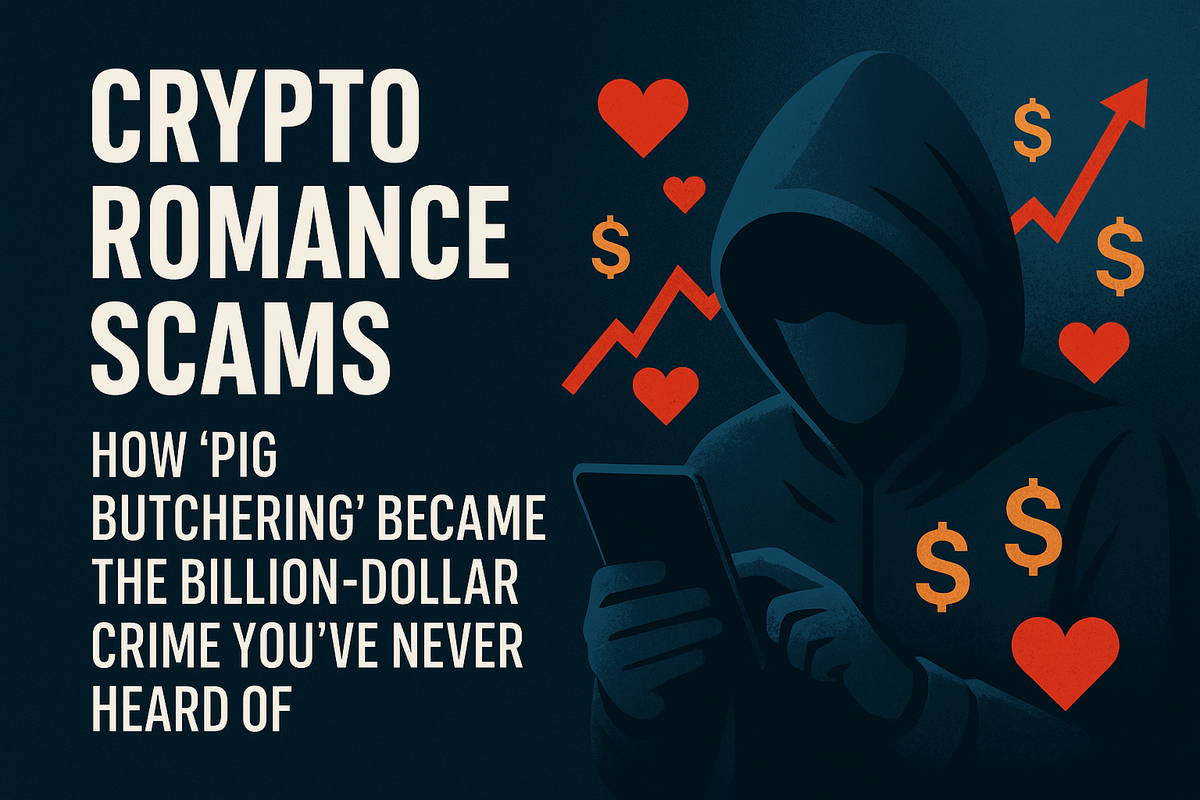Crypto Romance Scams: How ‘Pig Butchering’ Became the Billion-Dollar Crime You’ve Never Heard Of
Crypto romance scams known as “pig butchering” lure victims with fake love and investment promises. Once emotionally hooked, victims are drained of funds. This billion-dollar global fraud blends Tinder tactics with crypto traps, leaving heartbreak and financial ruin in its wake.

In the slick feeds of Instagram and the courteous greetings of Tinder messages, a crime wave is unfolding in secret a spreading world-wide scam so successful, so subtle, it has left veteran professionals, retirees, and even police reeling.
They refer to it as pig butchering a terrible name for a terrible offense.
The scam combines romance fraud, investment fraud, and the dark corners of cryptocurrency into a multibillion-dollar behemoth. Its victims not only lose their life savings but their hold on reality as well. And in 2025, the figures are only increasing.
This is the tale of how pig butchering evolved from niche hustle to one of the most profitable criminal operations of the decade.
What Is Pig Butchering?
The name pig butchering is derived from the Chinese term "shā zhū pán" (杀猪盘), which is literally "killing the pig plate." In jargon among scammers, the "pig" is the mark, nurturing him or her for weeks or months with kindness and trust before butchering him or her for all he or she owns.
This is how it is done:
- The Hook
A scammer develops an impersonation: a charming professional, a jet-setting businessman, a successful crypto investor.
- They reach out to victims on dating sites, WhatsApp, Telegram, LinkedIn, or even random messages reading "Hi, is this Kevin? Oops, wrong number."
- This "mistake" rapidly becomes innocuous banter and soon regular chats.
- The Fattening
- Weeks are spent by the scammer developing closeness.
- They provide pictures, doctored stories of success, and the illusion of an actual relationship.
- They casually mention their "safe and profitable" cryptocurrency investments.
- The Slaughter
- Eventually, they lead the victim to a fake trading website made to appear legitimate.
- The victim invests money, receives handsome returns (false), and is urged to put in more.
- When the victim attempts to withdraw, excuses start: taxes, fees, regulations.
- The money disappears permanently.
In the span of a few years, this technique has dwarfed conventional romance scams by orders of magnitude.
A Billion-Dollar Global Enterprise
Estimates suggest that pig butchering scams have defrauded victims out of at least $3 billion globally though experts believe the real figure is far higher due to underreporting and embarrassment.
Consider a few recent examples:
- A San Francisco man lost over $1.2 million after believing he was in a relationship with a woman who claimed she was helping him “unlock financial freedom” through crypto trading.
- A widow in Florida depleted her retirement fund and withdrew loans after an internet suitor vowed to give her a new life with him after she had paid "temporary tax holds" on her so-called profits.
- A UK computer programmer lost almost £500,000 funds that he had set aside for his kids' education because he believed he was investing in a genuine crypto investment fund.
These are not one-off incidents. They form a part of a networked, industrial-scale scam.
The Scam Machinery
Pig butchering is not the activity of a single con artist. Investigators have found the operations to be those of transnational crime syndicates, often based out of Southeast Asia, such as:
- Myanmar and Cambodia: Victims are commonly recruited to these countries under the guise of false job promotions, then compelled to work within scam compounds.
- Laos and Thailand: Call center and tech support front networks enable crypto wallet laundering.
- China: Some masterminds control the infrastructure and payment processors behind these sophisticated frauds.
A chilling fact: Some of the scam "operators" are themselves victims of human trafficking held in slavery under threat of violence.
This scheme combines:
- Social engineering: Establishing realistic-looking relationships.
- Phishing: Collecting personal and financial information.
- Money laundering: Funneling crypto through nested wallets and mixing services.
Because the transactions take place on decentralized blockchains, money is very hard to follow or get back.
Why Crypto?
Cryptocurrency is the ideal vehicle for these schemes:
- Pseudo-anonymity: They are public, but the owners of the wallets are not.
- Irreversibility: Sent funds can't be clawed back by any institution.
- Hype factor: Victims are often enticed by promises of high returns in an "upcoming financial revolution."
Per blockchain analysis company Chainalysis, pig butchering has become one of the biggest drivers of cryptocurrency-related crime globally.
Who Gets Targeted?
The trope of the gullible retiree is ancient. Victims are:
- Tech professionals who know blockchain but don't appreciate emotional manipulation.
- Finance and medicine professionals who believe they're too clever to be swindled.
- Young investors lured by the prospect of passive income.
Scammers research their prey thoroughly LinkedIn profiles, Facebook status updates, and dating app profiles all feed into their strategy.
If you believe it could never happen to you, think again: a 2024 AARP survey determined that more than 20% of Americans between the ages of 30 and 49 had been targeted by scammers employing pig butchering strategies.
The Emotional Fallout
In addition to the financial ruin, victims describe:
- Humiliation: Shame at having been duped.
- Isolation: Dread of judgment by friends and family.
- Depression and PTSD: An overwhelming sense of betrayal.
"I believed we were preparing a life together," said one victim to The Wall Street Journal. "By the time I figured out it was a fraud, I'd lost everything."
How Law Enforcement is Fighting Back
Pig butchering is a nightmare to combat for authorities:
- Jurisdictional chaos: Perpetrators, servers, and victims tend to cross multiple nations.
- Lack of regulation: Crypto exchanges not on the books are difficult to close down.
- Scale: Thousands of tiny transactions overwhelm the system.
But progress is being made:
- The FBI has formed specialized task forces to target crypto investment scams.
- Interpol coordinated raids on fraud compounds in Myanmar in 2024.
- The SEC and CFTC are cracking down on unregistered sites used to make fraud possible.
New regulations in 2025 are coming to compel stricter identity verification on exchanges and processors.
How to Identify a Pig Butchering Scam
These are the warning signs:
- Unsolicited approach particularly a "wrong number" that becomes daily chatting.
- Rapid emotional build-up "love bombing" within weeks.
- Crypto investment advice particularly if the contact is adamant about transacting using a specific platform.
- Guaranteed returns sign of a scam.
- Withdrawal issues explained with an excuse taxes, charges, verification.
If you see these indicators, halt interaction at once, report the profile, and speak with a financial crime expert.
The Future: AI-Driven Pig Butchering
The future is now: AI chatbots and voice cloning.
Thieves are now employing advanced big language models to maintain 24/7 chats, creating:
- Personalized love notes.
- Instant replies.
- Deepfake video calls.
In one such recent incident, a victim was made to believe he was FaceTime-ing with his "girlfriend" in Singapore. What he was actually doing was watching a deepfake AI-powered call.
This is an escalation of technology that makes scams more difficult to spot—and more emotionally persuasive.
What Can You Do?
If you think you've been targeted:
- Don't keep sending money no matter how believable the reason.
- Preserve proof screenshots, wallet addresses, transaction IDs.
- Notify authorities FBI Internet Crime Complaint Center (IC3), FTC, and your local police.
- Alert others speaking out can save more victims.
Last Thoughts
Pig butchering is a crime wave that grows in the shadows. Romance, technology, and greed are a potent combination and a uniquely destructive one.
But bringing light to these scams is the best way to put an end to them.
In a world where AI can mimic love and crypto can disappear in an instant, vigilance is not a choice it's survival.
Sources
- CourtListener: U.S. v. Zhimin Qian (Pig Butchering Indictment)
- Justia: SEC v. Yongfu Li (Crypto Investment Fraud)
- Archive.org: Chainalysis Crypto Crime Report 2024
- Google Trends: “Pig Butchering Scam” Search Volume 2023–2025
- FBI Official Press Releases (fbi.gov)
- The Wall Street Journal: “Crypto Romance Scams Leave Victims Broke and Broken”
- The New York Times: “Inside the Pig Butchering Scam Compounds”
- Reuters: “Crypto Crime Hits Record Levels in 2024”
- Interpol Official Notices (interpol.int)
For more legal exposes and truth-behind-glamour stories, subscribe to AllegedlyNewsNetwork.com




